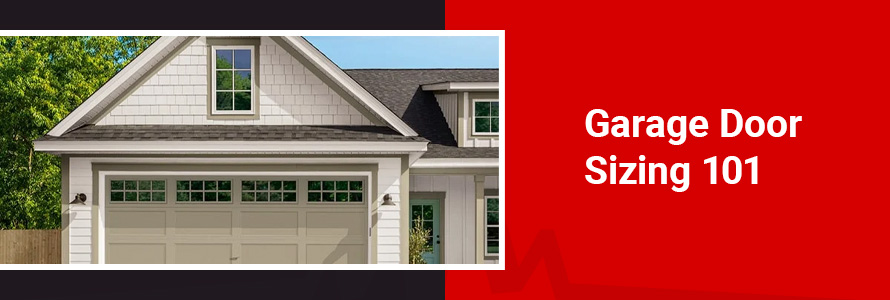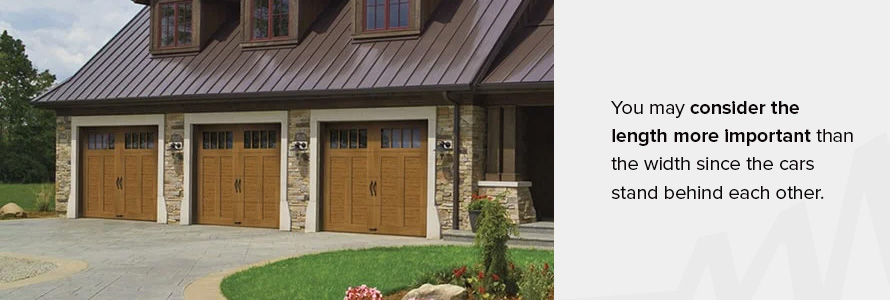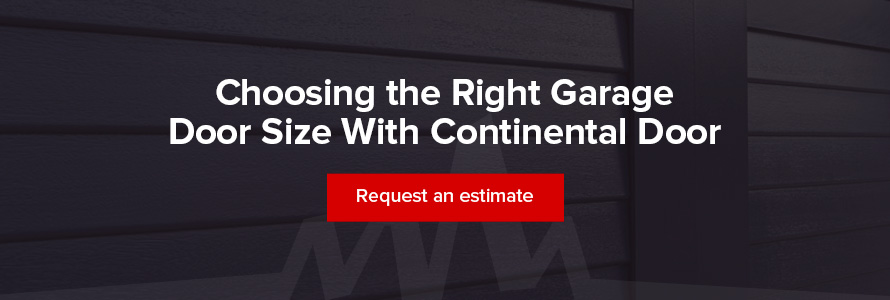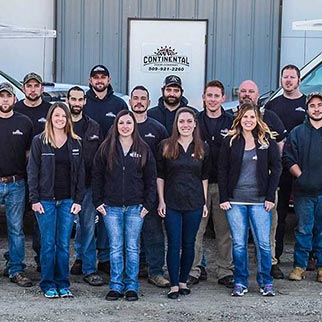Common Garage Door Sizing
Getting the right garage door size is essential when installing a new garage door at home. The number of cars your garage holds determines the size, but the measurements must be accurate to ensure a door that fits.
Explore the standard garage door sizes for various sized garages, including smaller and custom garage doors.
Understanding Garage Door Sizes for Your Home or Project
Whether you’re building a new garage or expanding your current one, the garage space comprises different dimensions that must be calculated individually and holistically to get the right door measurements. A tape measure is sufficient to calculate all the dimensions within the garage. These are the main areas to consider:
- Garage door opening: The opening or entrance to the garage is the size of the garage door, allowing the car to pass through. The door opening height and width are measured in inches.
- Side room: This is the space between the walls and garage door openings on both sides. Torsion springs are usually fitted in this space and should ideally be 3.75 inches on each side.
- Headroom: This is the area between the ceiling and the top of the door opening. Include the garage door opener clearance, usually about 3 inches.
- Backroom: This is the depth of the garage or the length between the opening and the back wall.
- Floor: This is the ground space between the four garage walls measured in length and width or square footage.
Overview of Standard Garage Door Sizes
Garage door sizes vary according to home sizes, but most are standard unless there are custom requirements.
The car sizes impact the dimensions as some homeowners may build according to the vehicle types. For example, they may have a hatchback, a Jeep or SUV, and an RV they want to park in one garage. Standard double garage door dimensions may not be suitable in this case.
The common dimensions for one- to four-car garages are measured in width by depth in feet, while other uncommon dimensions are included in the following section.
- One-car garages: These hold one car and are typically available in 8-by-7 feet, 8-by-8 feet, 9-by-7 feet or 9-by-8 feet. Another popular dimension is 12 -by-20 feet to accommodate a bigger vehicle and have enough space to walk around it in the garage and open the doors without touching the walls.
- Two-car garages: These fit two cars and come in standard sizes of 16 feet by 7 or 8 feet.
- Three-car garages: To fit three cars in a garage, you need approximately 30-by-20 feet up to 36-by-feet of space.
- Four-car garages: Housing up to four cars, this garage size is at least 40-by-20 feet up to 45-by-24 feet.
Detailed Dimensions for Various Garage Types
Regarding garage sizes, there are standard measurements, but the reality is that everyone’s needs differ. It’s not always a one-size-fits-all scenario. We explore the detailed dimensions for different garage types and what might best suit your requirements.
One-Car Garage Dimensions and Square Footage: Essential for Small Households
The dimensions for one-car garages are usually based on the home size. Households with only one vehicle don’t need much space but still need to avoid making the garage too small. Some smaller homes might have limited storage space, and a larger garage can help solve this problem.
In general, one-car garage dimensions include:
- Width: 12-18 feet
- Depth: 20-30 feet
- Additional sizes: 12-by-25 feet, 12-by-30 feet, 18-by-25 feet and 18-by-30 feet.
- Garage door width: 9-12 feet
- Area in square feet: 240-540 square feet
For more storage space, you could add half a car’s size in width, making the garage 18 feet wide instead of 12 feet. A 1.5-car garage provides ample space for a minivan or SUV in a single garage.
Two-Car Garage Dimensions and Square Footage: Ideal for Growing Families
Having multiple cars is common for growing families, so it’s important to accommodate an appropriate-sized garage. On average, double garages fit two cars and are measured as follows:
- Width: 22-30 feet
- Depth: 24-30 feet
- Additional sizes: 20-by-30 feet, 24-by-25 feet and 24-by-30 feet
- Garage door width: One 16-foot or 18-foot wide door, or two 9- to 12-foot wide doors
- Area in square feet: 360-660 square feet
The deeper or longer the garage, the more space you’ll enjoy. Consider adding 3-5 inches, depending on your vehicles’ sizes. You may want to have enough space for 2.5 cars, so you have extra room for storage or a workbench.
Three-Car Garage Dimensions and Square Footage: Balancing Space and Functionality
When you’re parking three cars, there are ways to balance space and functionality. Here, you may consider the length more important than the width since the cars stand behind each other. If parked next to each other to save space in length, one single garage and a double garage make sense.
Or, you could incorporate a four-car garage and use the additional space for storing smaller vehicles like a motorcycle or convert it into a workshop area.
How many square feet is a three-car garage? Standard dimensions for a single and double garage layout are typically these below:
- Width: 32-22 feet
- Depth: 20-30 feet
- Additional sizes: 36-by-24 feet
- Garage door width: An 8- to 10-foot-wide door and a 16- or 18-foot-wide door
- Area in square feet: 600-1,260 square feet
Detached three-car garages are another option if you don’t have space for an attached garage. Common dimensions for these include 32 x 24, 34 x 24 and 36 x 28.
Four-Car Garage Dimensions and Square Footage: A Multifunctional Space
Four-car garages require the most space in length and width and are versatile. So, how big is a four-car garage? These are the standard measurements:
- Width: 40-48 feet
- Depth: 20 feet or more
- Additional sizes: 24-by-45 feet
- Garage door width: Four 9- to 12-foot wide doors or two 16- to 18-foot wide doors
- Area in square feet: 800-1,680 square feet
Homeowners with four-car garages commonly use the extra space as a workshop, gym or recreational area.
Exploring Uncommon Garage Door Sizes
While most garages use standard garage door sizes, sometimes garages are built according to specific dimensions. Half sizes like 1.5 or 2.5-car garages can allow for more storage or workshop space, and five-car garages hold all your vehicles and projects.
With these, you’d add half a car’s width or more to standard sizes to achieve the ideal size.
Maximizing Your Garage’s Potential
The factors below contribute to maximizing your garage’s potential as you consider space and customization options.
Factors Influencing Garage Door Size Selection
Some factors that may influence the garage door size include:
- Garage type: The two main garage types are attached and detached from your home.
- Storage requirements: If you store hobby items and other goods alongside the parked cars, you’ll need a larger garage, which could mean a bigger door.
- Vehicle size: Ensure your garage is deep and wide enough to accommodate your varying vehicle sizes.
- Number of vehicles: Account for all your vehicles, including smaller, light vehicles like bicycles, motorbikes and scooters.
- Additional functionality: You may want to convert a section of a larger garage into a recreational or work area if you use a larger garage to park only one or two cars.
Utilizing Space Efficiently in Larger Garages
Larger garages allow numerous opportunities for utilizing space effectively. Whether you have a one-car or a four-car garage, you can use it for storage or as a recreational or work space.
Consider the garage layout and which parts are free. Corners and the far end are usually available to put up storage units or stack boxes. If there’s enough space, a table and chairs can create a lounge area.
Custom Garage Door Sizes: Tailoring to Your Needs
When planning a custom garage door, explore the options until you’re satisfied with what you can get. Value for money without compromising quality is key when considering the best local garage door companies.
A reputable contractor will advise you on customization preferences, like what can and can’t be customized. Explore their selections and what they can do for you.
Choosing the Right Garage Door Size With Continental Door
Continental Door’s expert team is always available to help our valued customers in Spokane and the surrounding areas. We have been driving customer satisfaction since 2000 and strive to deliver the best service.
If you’re interested in installing a new garage or upgrading your current one and need help determining the right garage door sizes, call us or request a free estimate today. We are always eager to help!




